1-5-20
And Then We Danced: Levan Akin Visits Georgia
By Diane Sippl
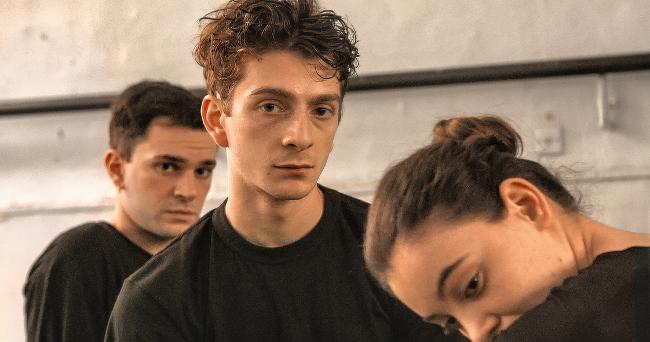
The 21st Scandinavian Film Festival L.A. met for two full, non-consecutive weekends at the Writers Guild Theater in Beverly Hills this year, on January 4-5 and 11-12, 2020, delivering theatrical, documentary, and short-subject films not only from five Nordic countries—Sweden, Norway, Finland, Iceland, and Denmark—but also from the Baltic region—Estonia, Latvia, and Lithuania. Such a wide spectrum is expected by fans each year, but what also welcomes them is films from the diaspora, such as American independent productions, and more and more often these days, international co-productions. The most striking of these this year was a vibrant, highly cinematic drama celebrating what, for many in the audience, was thought to be an exotic art of long ago and far away—a change of pace for those in attendance with ties to the far North.
You look at Levan Akin’s gorgeous film, And Then We Danced, and tell yourself it’s a Georgian film if you ever saw one. The Tbilisi setting, the Georgian language and actors, the conflict of young love between a dancer from the capital and a stranger from a remote town—and, above all—the phenomenal traditional dance scenes—all attest to the culture of an ancient land of less than four million people nestled under the Caucuses on the Black Sea. The country’s long, rich, cinema history comes to mind: Abuladze, the Shengelayas, Iosseliani, Gogoberidze, more recently Koguashvili, Ovashvili, and the loss of the late, great Zaza Urushadze in December. Music, dance, and a keen visual sensibility have made their films enviable among cineastes.
And yet the sensual delights of Levan Akin’s recent opus distinguish his work, steeped as the film is in the Georgian dance tradition. Premiering his film in the Directors’ Fortnight segment of the 2019 Cannes International Film Festival and then making a round of pre-Oscar screenings in Los Angeles upon its official submission by Sweden to the 2020 Academy Awards for Best International Feature Film, Akin talked to audiences about what it was like to work as a Nordic filmmaker in Georgia. Three aspects of the culture, he tells us, are upheld as the paragon of Georgian national identity: the Orthodox Church, the traditional polyphonic singing, and the national dance. In his film, traditional Georgian dance represents the “old,” and the burgeoning love between two of the dancers represents the “new,” Akin has said. What follows are edited excerpts from a talk with Levan Akin and his two lead actors moderated by Tray Williams of The Wrap after a special screening of And Then We Danced about a month before the Scandinavian Film Festival Los Angeles.
TW What prompted this film? Where did the inspiration for the story come from?
Director Levan Akin I live in Sweden, in Stockholm. I was born and raised there, but my parents are Georgian. Back in 2013 I saw news videos of a Pride Parade in Tbilisi. Fifty people tried to have Georgia’s first Pride Parade, and they were attacked by 20,000 counter-demonstrators organized by the Georgian Orthodox church and some other conservative groups. The images were pretty brutal. Nobody was severely injured, thank God, because they could take refuge in a bus, but it was horrific. You can Google that and see for yourself.
That stuck with me. I’d always seen Georgia as sort of—in a way it’s the most progressive country in the region because they have laws to protect LGBTQ people, but they’re not properly implemented, and there’s no information for people about them. Also, Russia is working there a lot, overtime, in Georgia and the rest of Europe, to sort of splinter us. They’re using this LGBTQ thing as a way of dividing the country. They call it like a “gay disease”—as if when you go west, everybody’s gonna turn gay, basically.
I went to Georgia in 2016 to research the subject. I never had an idea to make this movie. It just grew, through my research, and I met dancers along the way. For a while I was doing a documentary. I worked in a way that I’d never worked before with this film. I was very much in the moment, just using what happened around me while I was working. It was very fun.
How did you start to tell the story through dance, and through that tradition?
I wanted to make something that was a love letter to my heritage, and also, I wanted to make a film about culture and identity and tradition because I feel there are so many people in the world—in Sweden, too—who keep telling other people what boxes them in, for being considered Swedish, for example. I just feel that people have the right to define themselves.
And I wanted to make something celebratory of something that was so dark—something hopeful, and I felt that dance was a good way to do that. Also, it was a cinematic decision because dance is beautiful to look at, and it’s fun. I don’t think many people have seen Georgian dance, so I thought it was a good entry point, and it is so gender-conservative in the Georgian dance world that I saw another reason that it would be a good stepping-off point. Furthermore, I'm not fluent in Georgian because I grew up with Swedish, and I could do a lot of scenes without dialogue, using just bodies and motion.
Is that how you came to Levan Gelbakhiani? Because you are dancers, right?
No, I actually found him on Instagram. He is a dancer, and when I met him, and I met Bachi Valishvili. That also inspired the film. Again, I never set out to make a specific film. For me, this film was sort of beyond myself. I come from a very classical background. This is the first time I worked in this way.
What do you mean, in what “way”?
I couldn’t really plan things, because we had to film secretly in Georgia, and we would lose locations on one day’s notice. We had security guards on set. We got grants, but we had very little money; we shot the whole film for about 200,000 Euros.
We got some money from the Swedish Film Institute and from France. Obviously later when we got into Cannes we got more money for post-production. I had the beginning, the middle, and the end; but I needed a cohesive narrative. And then everything in-between, you know, like the English cigarette stories—they were talking about that as well, so I incorporated that. We shot it in a very neorealist way. I worked with a lot of non-actors in existing locations. Everything is based on real stories I’d gathered and things were constantly evolving. The prostitutes were working that night—we just came out and filmed them. The restaurant where he worked was open—so we were like this guerrilla team running around Tbilisi shooting this movie, and then they would come running after us, and we would hide. I would wake up in the morning and be like, ‘What are we doing today? I don’t know. Okay. Can we still…’ and then I would re-think stuff, and…
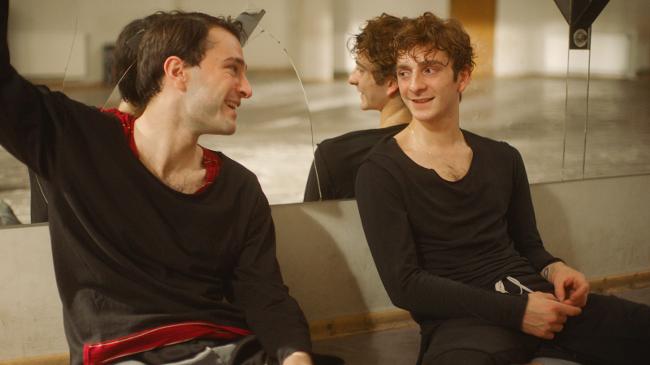
Levan, it’s my understanding that initially, you didn’t want to do the film?
Actor Levan Gelbakhiani In the beginning, when they offered me the role, I was a little bit hesitant because of this topic and because of fear of the society, but then I discussed it with my friends and my family and they said, okay, if you want to do it, just do it, so we met. Our costume manager called me and said, ‘This foreign director wants to meet you, so let’s meet him and discuss it.’ And I said okay, and then we had this discussion and we read the script. We filmed a teaser for funding, and I really liked it.
Levan Akin I think it’s important to know that one week ago—ten days, actually—we had a premiere in Georgia. If you Google it when you go home, you’ll see what happened. It was all over international media. Initially we planned three days of screenings, and then we were going to prolong it, but there was a lot of mayhem, and people trying to block the cinemas. Fortunately, all the audience members who wanted to see the film got to see the film, but they had to be brave and risk getting beaten up just to enter the cinemas. It was terrible, actually. Some people were hurt, and we couldn’t continue the screenings because the cinemas needed so much extra personnel. There were about thirty policemen in every theater in order to screen this film, but we still managed to do it, because we got the film shown, so I’m very happy for that, though I wish we could have shown the film more.
It’s something I wanted to ask all three of you about—just by the nature of this film existing, it seems to be a very political statement in Georgia.
Levan Akin In the region, actually—I mean, I don’t want to talk too much about Russia, because it’s scary.
Actor Levan Gelbakhiani I’m probably on some list—
Levan Akin Yea, it’s no joke. They have spies everywhere. I’m being totally serious; I’m not being paranoid, because while we were shooting the film, strange things happened. They leaked a working copy of the film on Russian sites exactly timed to ruin our screenings in Georgia. It’s a bigger political thing, because just look at Poland, Hungary, Serbia—Russia, Putin, his aim is to splinter and divide, and he’s doing that very much in Georgia. Twenty-five percent of Georgian land is occupied by Russia, and they sneakily move the border every night. A few years ago, it was 20% and now it’s 25%, and those people standing outside the cinemas are directly funded by Russia. They claim to be patriots of Georgia, but if they were true patriots they would stand by the border, screaming at the guards.
So, as much as cinema can spark a change, what do you hope this film can do for the world? What can we get from it?
Levan Akin (to the actors) I think you should answer that, because I think you have a good example, with your friends; you guys are more on the ground than I am.
Actor Bachi Valishvili Actually, recently I heard from a childhood friend. Well from what I knew, when he was a kid, he was very aggressive, part of this whole homophobic movement that exists, and he grew up and kept being like that, and we were not fiends, later, obviously. But he actually texted me a few days ago saying how proud he was of this movie and how proud he was of us for making this movie and for being in it. It was a jarring moment for me, because it actually affected him in a very positive way, and he was saying that the people protesting in front of the cinemas are bigots and they should just ‘f--- off’, as he said.
So the movie actually has some sort of impact in Georgia, and I’m very glad and proud of that, because it’s about time in our country for that to happen. Also, the fact that this movie is made with a lot of love and positivity is a change in the general narrative, in how we talk about this issue back home, at least. And I think that’s the part that really gets to people—the positivity and the energy it has; it kind of rubs off on a lot of people, all around the world.
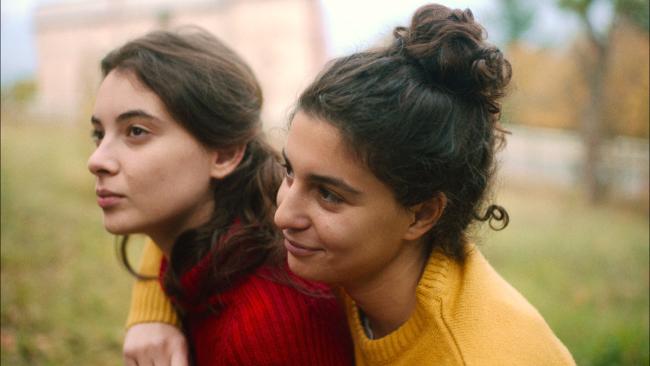
Levan Akin It’s a hopeful film, I think, and I feel that we in the West, in parts of the West, at least, tend to forget that the struggle is very real, even probably in America, if you go outside the bigger cities. I know that’s the case in Sweden—that people can’t really be themselves.
But this film is really an homage to Georgia and to Georgian culture. I don’t think it’s mutually exclusive—you can love tradition and culture and be proud of it and still be outside of the norm, and that’s my message—to reclaim your culture and tradition and not let the bigots have it and do what they want with it. I mean, I’m as Swedish as anybody else in Sweden, even though they don’t consider me Swedish because of my parents—I’m a dark-haired Swede.
One thing I found interesting about your film and about Levan, your character, is that he’s not struggling with any sort of interior desire or whatever. It’s not a coming-out story.
Levan Akin No, and that was a conscious choice. I wanted to make a very classical story because I wanted it to be universal, but at the same time I wanted to up-end some of the tropes of queer cinema, so I wanted him never to struggle with his sexuality. I wanted him just to be loved and happy. I wanted him never to get beaten up or anything, and never to have to come out.
You know sometimes when people come out, it’s like telling a person you’re sick or something. He’s just this kid who fell in love. And also, the scene with his brother in the bed—I wanted to show a new version of that story, because you never really see that, so I planted a lot of this. With his girlfriend, you think that she’s maybe going to bust them. I wanted to plant these expectations, and then to up-end them, and change them, and show a different type of queer narrative.
Did that change your approach for coming into the story, knowing that it’s not just a silly coming-out story, but it’s about love and….
Actor Bachi Valishvili Love is love, man!
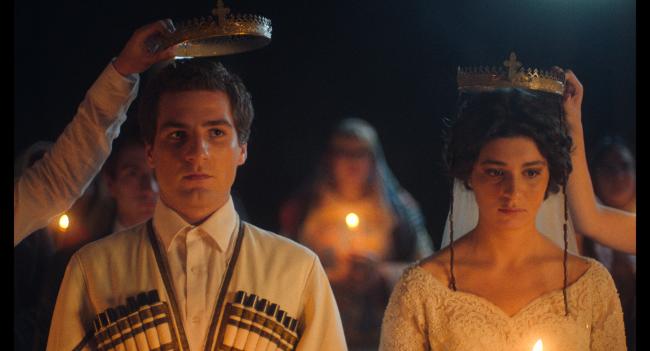
Levan Akin Again, for me the story is just a catalyst for his character to allow himself to be free and be himself. That’s something I identify with a lot. Many people don’t live their lives for themselves, but for other people—what’s the boss going to say, or your mother, or your grandmother, or your father? You don’t really make your own choices, and then you’re old one day and you think, ‘Why didn’t I do the stuff I wanted to do?’ So I think the last scene, when he sort of bows to the teacher—I think we’ve all wanted to do that to somebody. That’s what the film is about to me.
You’re walking into something that I wanted to ask about his last dance performance. You set it up in the beginning of the movie, when he’s watching the clip of the dancer.
Well, I think it’s sort of clear what’s happening in that scene.
I was thinking, what is his narrative that he is portraying in the dance, to the teacher and the students?
Levan Akin That’s a good question, and I don’t know if I should answer that because I think it should be up for interpretation. That’s the beauty of dance, in a way. I know my answer, but I’m not going to say it.
Actor Levan Gelbakhiani Just so you know, we are not Georgian dancers, and the Georgian dancing is really hard to do. We had only three months to study this dance and choreography. It was very intense because we had to dance and we had to act. Sometimes I could really feel these muscles in my body.
Actor Bachi Valishvili I didn’t even know I had those muscles.
Actor Levan Gelbakhiani He lost seven kilos.
Levan Akin Yea, Georgian dance in Georgia—all the kids do it as an after-school activity. All the grandmas drag the kids to Georgian dance. I think most kids in Georgia have some skill with it, but you guys (the actors) had to freshen it up a lot.
Actor Bachi Valishvili I always thought that never in my life would I need to know Georgian dance. When would I ever use it?
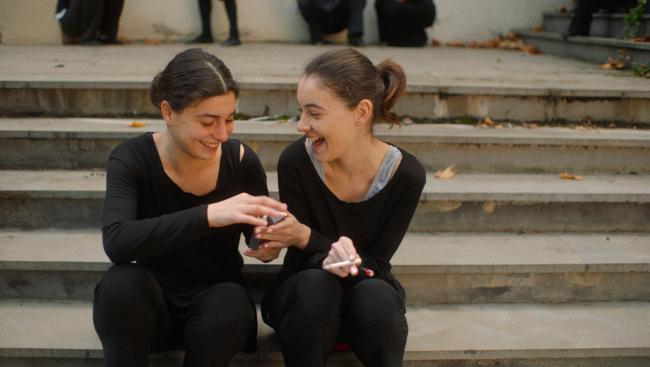
Levan Akin I’m a diaspora Georgian, and I always had this rose-tinted view of Georgia—the music, the food, the wine. I came to Georgia wanting to hear those old songs and eat that old food, and I would talk to the kids and ask, ‘You know that old song…?’ and they’d be like, ‘ew…’ For them those traditions stood for oppression, patriarchy, and the paternal generation—which they don’t like. And that made me sad, because as a Georgian, I wanted to say, ‘Look, kids, take this culture and do your thing with it—own it and have fun with it and play with it, because tradition and culture is always changing.
And Then We Danced
Director: Levan Akin; Producers: Mathilde Dedye, Ketie Danelia; Screenplay: Levan Akin; Cinematographer: Lisabi Fridell; Editors: Levan Akin, Simon Carlgren; Sound: Beso Kacharava; Music: Zviad Mgebry, Ben Wheeler; Production Design: Teo Baramidze; Costume Designer: Nini Jincharadze.
Cast: Levan Gelbakhiani, Bachi Valishvili, Ana Javakishvili, Ana Makharadze, Giorgi Tsereteli.
Color, DCP, 106 min., Georgian with English subtitles.